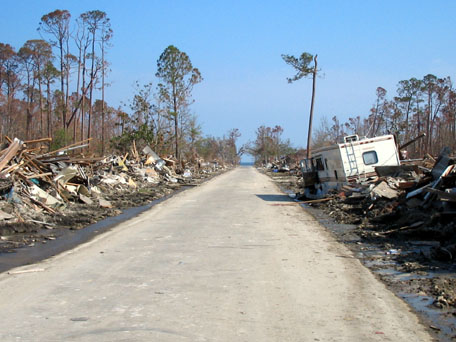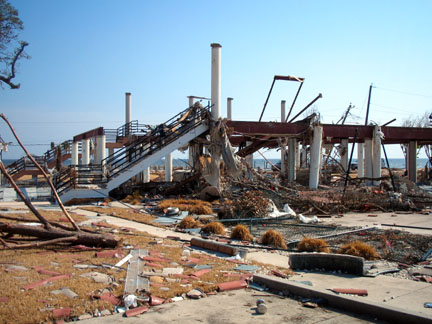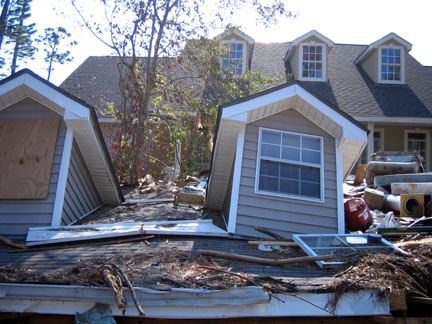JACKSON, Miss.—For days, Dennis Cagle sat glued to his computer screen as he watched Hurricane Katrina’s swirling mass move menacingly toward Mississippi.
As safety officer and disaster coordinator for Methodist Rehabilitation Center, it was his job to monitor the progress of the monstrous storm. And as it became clear that Methodist might be in its path, Cagle declared a Code Purple.
The launch of the hospital’s all-hazard disaster plan sent employees scurrying. They stored outdoor items that might take flight in high winds, topped off vehicle fuel tanks and ordered extra food for the cafeteria.
It was the first of many moments when Methodist staff quickly handled a Katrina-related challenge, and Cagle says he won’t soon forget the dedication of everyone involved. “I learned as disaster coordinator one person can’t do it. It was a group effort from the board to the staff.”
Cagle and Marcia King, education director and safety committee member, said paramount to the success of preparations was the involvement and commitment of Methodist leadership, particularly chief operating officer Joe Morette.
“He served as the point person for the whole operation,” King said. “Without his active involvement we wouldn’t have accomplished as much as we did.”
While Katrina was still gathering strength in the Gulf, Cagle said his planning focused on the possibility that the hurricane might spin off tornadoes. But it soon became clear that Methodist needed to prepare for more than mere wind damage. “After seeing what happened when Katrina hit, we realized we needed to get on the stick,” Cagle said.
As the hurricane made landfall and lumbered toward Jackson, administration staff devised a plan to maintain vital services in the storm’s aftermath. All but the most essential employees were sent home at noon on Monday, Aug. 29, and support services were put in place to house and feed staff who stayed on duty.
“The third floor became like a dormitory,” King said.“If those rooms had been full, we were prepared to use the mat tables in the therapy room,” Cagle added. “We even planned to put mattresses on the floor in the conference room for family members that might come with patients.”
Cafeteria employees geared up to provide meals and snacks to all who were hunkered down in the hospital. And the therapeutic recreation staff made plans to provide childcare, if needed.
In the storm’s wake, a survey of Methodist’s campuses revealed only minor damage—downed trees, battered roofs and leaking windows. While repairs commenced, the administration’s focus shifted to staffing concerns related to the growing gas shortage in Jackson.
To ensure essential employees had enough fuel to come to work, Methodist board member Matt Holleman arranged for two tanks and 3,000 gallons of gas to be delivered to the hospital. Employees also had access to gasoline at a local station that was open only to staff of area hospitals.
Once employee concerns were covered, the hospital reached out to help other healthcare facilities hard hit by the storm. “Rehabilitation patients require special care, so we were eager to come to the aid of people who were in places where rehab facilities were damaged or they needed to free up beds for hurricane victims,” said Methodist chief executive officer Mark Adams.
On Sept. 1, Methodist took in three transfers from Forrest General Hospital in Hattiesburg and four from the University of Mississippi Medical Center in Jackson. Around 11:30 p.m. Sept. 2, a yellow school bus from Gulfport Memorial Hospital pulled up at Methodist carrying 13 patients. By midnight, another four transfers arrived in vans.
“They had experienced everything from strokes and fractures to brain injuries and amputations,” said Janice McGee, vice president and program director at Methodist. About 25 Methodist employees—including doctors, nurses, therapists, administrators and admissions personnel—warmly welcomed the exhausted evacuees and quickly turned their attention to ensuring the group was safe and comfortable.
“We had hot meals prepared for the patients and clean beds and linens,” McGee said. “They said they thought they had died and gone to heaven. They were so glad to see such a bright beautiful building with lights.”
King said the influx pushed the hospital’s patient census well over the usual number, but staff adapted. “There was a great spirit of cooperation. Everybody had the focus: Let’s take care of business.”
Cagle said the safety committee learned a few lessons during Katrina that will be used to improve the hospital’s disaster plan. But for the most part, he believes staff response was above and beyond the call of duty. ““Everyone did a fantastic job,” he said. “They came together and made it happen regardless of what it took. We even had a secretary and a security person serving food.”




